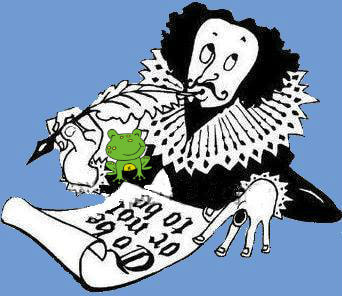Laughing stock, A sorry sight, Dead as a doornail, Fair play, Eaten out of house and home, In a pickle, Wear my heart on my sleeve, In stitches, In the twinkling of an eye, Mum's the word. Neither here nor there, Send him packing, There's a method in my madness, Too much of a good thing, and Vanish into thin air. Each of these common phrases came from the bard himself, William Shakespeare. Granted, many of them came from different plays but they are all from Shakespeare's works.
Scholars don't know if Shakespeare actually invented all of these sayings or if many of them were already in use during his lifetime. it is a fact that it's difficult to determine when a word or phrase first came into existence, but Shakespeare's plays often provide the earliest citation. Interesting to note is that Shakespeare didn't write for high society; he wrote for mass audiences and unlike many artists and writers, his plays were hugely successful in his lifetime. He was even asked to perform for Queen Elizabeth I and retired a wealthy man. Now that's something few artists can say!
"It is unsurprising therefore that many phrases from his plays stuck in the popular consciousness and subsequently embedded themselves into everyday language." In many ways, these phrases from Shakespeare's works are like the "catchphrases" from the popular TV shows of today. But in his time, long before television was even a daydream, theatre was the most effective way to entertain and communicate with large audiences. William Shakespeare was, after all, in the business of entertainment. He was "The Greatest Showman" of the Elizabethan Age.
As with many enduring things, language evolves and changes over time. One of the best examples of this is from Shakespeare's Hamlet. "Sweets to the sweet" from that play has long been used as a romantic utterance. But when it was first said by Hamlet's mother, as she spread flowers over the grave of Ophelia, her son's lost love.
Shakespeare's words have survived hundreds of years and live on in culture, tradition, and literature. "His writing is so deeply ingrained in the culture that it is impossible to imagine modern literature without his influence." Four centuries after his death, we are still using Shakespeare's phrases in our everyday speech. So the next time you utter, it's "neither here nor there" (or one of his many other common phrases) stop and think to yourself that you're quoting William Shakespeare! And should you mention this fact to your children, I bet they'll roll their eyes. I did when my mom said it to me.
Tomorrow is Wednesday and that can only mean one thing, a visit from my wise and wonderful teacher, The Dharma Frog. I don't know what my lesson will be this week, but I'm sure that whatever it is, it'll be something interesting and worthwhile. Until then,
PEACE.

 RSS Feed
RSS Feed